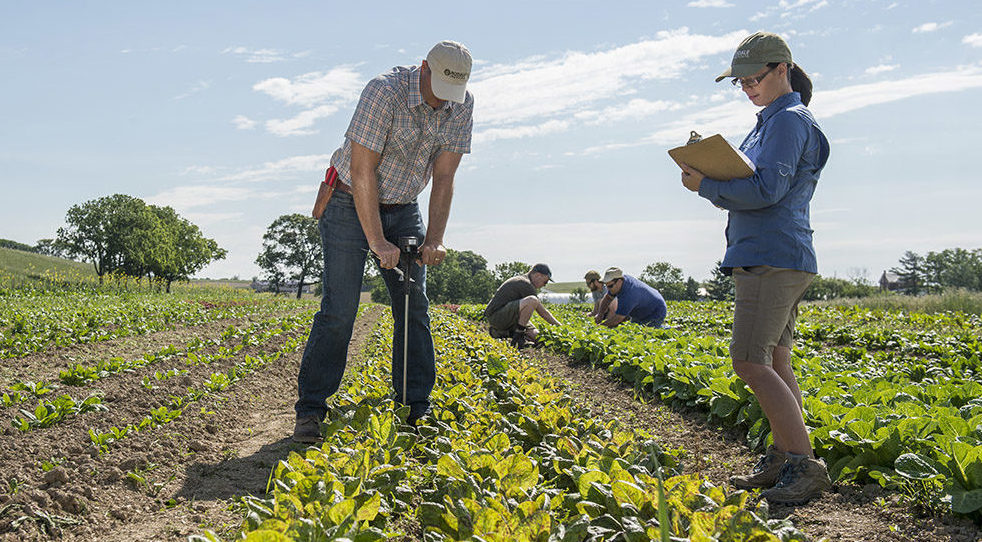 Photo Credit: Cynthia van Elk
Photo Credit: Cynthia van Elk
The Organic Farming Movement was #MadeInPA
Jason Forrester grew up on a farm in Chambersburg, PA. The family originally grew a variety of vegetables, but like many peers, transitioned to planting mostly corn and wheat.
After his father passed, Forrester elected to forgo those 2,500 acres and buy his own piece of land. He began by cultivating conventional crops alongside a tractor-selling business, but he was disappointed with the results from using pesticides. Then a neighbor asked him to consider growing organic feed to supply their dairy cows. Forrester gave it a try.
That decision is one being made by farmers across Pennsylvania. With more awareness about the benefits of choosing organic for both the planet and personal health, the global market for organic produce, dairy, meat, and grain has surged in recent years.
Pennsylvania is now the third leading state in the country for total sales of organic products (trailing behind California and Washington). And in 2019, Pennsylvania’s $742 million sales of certified organic commodities represented a 12 percent increase from 2016. The state is consistently in the top five states for organic mushrooms, eggs, turkeys, dairy cows, and farms.
Forrester admits that transitioning to organic practices came with significant growing pains.
“You really have to have a solid game plan,” he says. “I tried to switch over all 400 acres at once, and I was still getting conventional prices.”
But after working with neighboring farmers for three years, he got over the hump and received the back pay for his organic crops. He also tapped into a growing need for organic hay and corn and grows wheat and barley to fill the increasing demand for organic grains.
Forrester is passionate about sharing his new skillset with other farmers. In fact, he has helped switched over at least half a dozen other local growers by connecting to people through the tractor business.
“My system is working the way it’s supposed to,” he says. “I can see my ground getting better every year.”
History Lesson
Farmers like Forrester have a powerful statewide legacy to build upon: The word “organic” was actually born in PA. For more than 70 years, the Lehigh Valley-based Rodale Institute has been dedicated to advancing organic farming through research and outreach.
“Our founder, J.I. Rodale was the person who coined the term ‘organic’ as it’s used today,” explains Rodale Chief Growth Officer Jeff Tkach. “[He] also began pioneering organic food production right here in eastern Pennsylvania. The fact that we have a headquarters here and host more than 25,000 people a year at our Institute has a big impact.”
The Berks County-based nonprofit researches the best practices of organic agriculture and shares its findings with farmers and scientists throughout the world, advocating for farm-friendly policies, and educating consumers about why going organic is the healthiest option for people and the planet.
Farmers and growers can also visit and learn directly from Rodale. With funding from the state, the Institute recently launched the Organic Crop Consultancy, allowing any PA farmer to get free consulting during their transition to organic.
It’s helpful to have a central repository of expertise because Pennsylvania is very diverse agriculturally – the state produces dairy, grains, orchard fruits, vegetables, hemp, and livestock.
“The beauty is [that organic farming] is really everywhere, from urban Philadelphia — you can literally find certified organic farms right in the middle of the city — to places like Berks County and Lancaster County,” says Tkach. “We’re really seeing it spread across the state.”
Organic mushrooms are a major calling card. Kennett Square is considered the mushroom capitol of the world. And, thanks to new legislation, hemp farming is another big opportunity for farmers.
“It’s a high value cash crop that can be used for a myriad of applications,” explains Tkach. “Fortunately, Pennsylvania has really taken a pretty a progressive stance on [hemp].”
But as demonstrated by Jason Forrester’s experience, there is a learning curve for farmers. According to Tkach, the biggest barriers are lack of information, solid research, and training. The other barrier is the market, which for a long time was slow to adopt and pay a premium for food according to how it was produced.
But consumers are beginning to demand organic.
“Currently organic is 6 percent of our nation’s food system, but only about 1 percent of farmland in the U.S. is farmed organically,” he says. “So, we’re forced to import a lot of our own food.”
Tkach hopes we are at a tipping point.
“The industry has grown by double digits every year for the last 10 years,” he says. “As more consumers begin to demand organic food, the market will be there and the prices will come down – it’s a pretty natural law of supply and demand that we’re going to see play out.”
Looking Forward
Hannah Smith-Brubaker, executive director of Pennsylvania Association of Sustainable Agriculture (PASA), credits Rodale with helping the movement grow, but she reserves her highest praise for the farmers themselves — they were the pioneers. In fact, if her own children take over Village Acres Farm, the organic vegetable and pastured livestock farm in Juniata County she runs with her partner, they would be fourth generation organic farmers.
PASA started as a farmer-led annual conference, and that meetup is still the keystone of its programming, drawing farming and sustainable agriculture experts from around the world. PASA also coordinates farmer-to-farmer education year round, including the first state-approved farming apprenticeship program.
Smith-Brubaker, who previously served as Pennsylvania’s Deputy Secretary of Agriculture, says it’s important to put some parameters around the idea of Pennsylvania being second in organic agriculture – we are second in sales but not in acreage.
“Pennsylvania is first in the nation for direct to consumer sales from farms, so we already have this direct marketplace that works very well hand with organic agriculture,” she says. “There’s also our proximity to large markets: Philadelphia, New York, Washington, D.C. In fact, an enormous percentage of U.S. population is within a day’s drive of our market.”
Smith-Brubaker believes the number one obstacle to organic growth is simply perception.
“People automatically think that organic farms are small,” she says. “But we have some of the largest organic produce farms on the East Coast, including Lady Moon Farms and Spiral Path Farm.”
She also argues that many farmers are daunted by the three-year transition period [required for organic certification], which can really impact their income. Fortunately, the State of Pennsylvania is committed to helping grow organic agriculture. A recently passed $23.1 million farm bill is one of the first statewide farm bills in the country.
The first-ever PA Farm Bill creates state-specific guidelines for marketing Pennsylvania’s products to a global marketplace. It also supports urban agriculture and created a new state-level Specialty Crop Block Grant program to boost growing industries like hemp, hops, and hardwoods.
The bill also carves out significant funds to support the PA Preferred program and create a new PA Preferred Organic Initiative to enhance the growth of the organic sector.
According to Smith-Brubaker, with the expansion of resources and consumer interest, more farmers like Forrester will continue to transition. Conventional farmers who have made the leap to organic are the best advocates, especially those who did it for economic reasons but now see the ecological benefits. Plus, the market continues to grow.
“Even if every grain crop farmer in Pennsylvania transitioned to organic it wouldn’t meet the organic grain needs of our state alone,” she explains. “So that’s a big area for growth.”
This story was created in partnership with Keystone Edge.

Paige Wolf
Paige Wolf is an author, publicist, and advocate dedicated to creating meaningful progressive change locally and globally. Paige is the author of Spit That Out! The Overly Informed Parent's Guide to Raising Healthy Kids in the Age of Environmental Guilt and the owner of Paige Wolf Media and Public Relations, a PR firm focused on mission-driven clientele. Visit spitthatoutthebook.com for her blog on making green and healthy living practical, manageable, and affordable.
